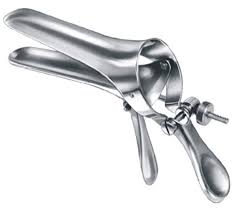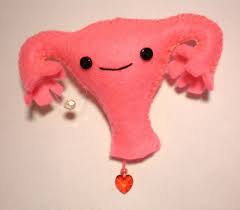Hello my name is Thea and my cervix hangs to the left
Every woman’s favourite pastime – the pap smear
Once every 12-months (or so) I rock up to my gynaecologist to spend about 15 minutes of my life having my cervix scraped. And that day was today.
The reason that I go every year, as opposed to every two years like most other women in Australia is because I have a history of dodgy pre-cancerous cells in and around my cervix. And in the interests of public service I thought I’d share a little about what I’ve learned over the last nine years since my cells all started going a bit bonkers and I became increasingly phobic of having a speculum inserted in my vagina.
What is a pap smear and what why should be having them
“A Pap test looks for changes to the cells of the cervix that, if left untreated for a number of years, could develop into cancer. Thankfully, most cell changes aren’t dangerous and will either clear naturally from our bodies or can almost always be treated if found early.
The Pap test does not test for cervical cancer or diagnose cervical cancer.“
PapScreen Victoria goes on to explain that the test might be a bit “uncomfortable”. And it is…find me any women who enjoys lying legs akimbo, hands in fists under her bottom, having a, hopefully pre-warmed, speculum inserted into her vagina and having her cervix scraped.
A speculum, for the uninitiated is one of these little beauties, that it turns out you can buy online these days for your own personal use.
Whilst my gynaecologist is still into the old-school metal variety, apparently there are less chilly plastic ones in use elsewhere.
Cell changes are normal. All our cells change over time. And oftentimes cells will go a little bit haywire and then the body does it’s cool magic and they right themselves. Sometimes though they keep on changing and that’s when having regular pap smears is important. Because hopefully you can catch the crazy cells before they turn into cancer.
My abnormal cells
I’ve been having pap smears for yonks. Back in the UK the advice was to start having them as soon as you became sexually active, or turned 18, whichever happened first. So let’s just say I’ve been having them for at least 20 years.
Back in 2009 I’d had lots of pap smears and lots of negative results. I’d also had two babies, but I was still really good at having my cervix scraped regularly. Then I got a letter explaining that my most recent pap smear had indicated the presence of ‘abnormal cells’.
I remember that day as if it was yesterday. It was a Sunday and I’d just come home following my first open water swim since having the children. I was super happy at coming 13th in my age group and having survived the whole ordeal in the river Thames in London. Until I opened the letter.
You never expect to get a negative result. I had always been really carefully with regards my sexual partners and had been married and baby-making for the last five years. I remember being at yoga that night doing my best attempt at shivassna with tears streaming down my face thinking,
I won’t see my beautiful babies grow up, go to university, get married or have their own beautiful babies.
Tests, questions and more tests
To cut a long story short, I ended up having to have some further tests to figure out just quite how abnormal my abnormal cells were. The first was a colposcopy which basically involves a similar bit of action to a pap smear but this time the gynaecologist squirts a kind of medical version of vinegar on your cervix. Dodgy cells will react with the vinegar and then they take a little bit of your cervix off to be tested. Feels like a sharp pinch. But it’s your cervix so it’s a bit more unpleasant somehow.
It was at the colposcopy that I started to get a little bit over the whole cervix scraping thing. There’s no anaesthetic involved. It’s not so much that it’s painful as invasive. And did I mention that they cut a bit of your cervix?!
If you don’t relax Mrs Terry, then you’ll be taking that speculum home with you.
I was informed by the gynaecologist that should the results indicate that my cells were sufficiently abnormal so as to require surgical removal then I would have to have a general anaesthetic based on my anxiety levels.
And I guess they didn’t want to lose another speculum.
At every stage of this process I had ever-increasingly abnormal pathology results. After the colposcopy I had to go back in for the aforementioned general anaesthetic so that the surgeon could perform a LLETZ incision where I basically had a few chunks of my cervix cut away and then cauterised. My cells, it turned out, were suitably malformed that weren’t going to sort themselves out and would turn into cancer cells at some point, so better to remove the whole area entirely.
Ask the right questions, get the right answers
Pathology showed that my cells were just on the normal side of cancer (phew) and I would need to have regular six-monthly pap smears and HPV tests for two years. My cells indicated that at some point I had contracted human papillomavirus (HPV) which is one of the most common sexually transmitted infections that is pretty much symptom-less.
I’m not going to go on rant about the importance of protected sex. Nor am I going to go into the long and messy story of the intervening eight years. However I have learned a few really important lessons that I try to share whenever possible.
Know your body:
I still have to have yearly pap smears because I still present periodically with HPV effects. That means I will probably always battle with rogue cells and always be affected by this STI. I dread each trip to the gynaecologist for fear of finding out some bad news. But I have taken it upon myself to be informed about my body. I ask really annoying questions of my gynaecologist. I won’t ever get to see my cervix the way he does so I try to get him to explain to me.
I know for example that my cervix is positioned to the left of the midline, which explains (in part) why I find speculum insertions to be quite so awkward and uncomfortable. I also know that my cervix is looking more stable than it has in previous years.
Have the right team:
Because of the repeated pap smears and two further gynaecological surgeries to figure out why I wasn’t healing properly from the initial LLETZ incision, I’ve always had a gynaecologist work with me and do my smears. My GP keeps volunteering his services but I decline. It would be cheaper that way. And easier too. But it’s taken a while for me to get speculum-comfortable and for my gynaecologist to figure out the whole hanging to the left thing. That relationship is gold. And we work together now to ensure my cervix is happy.
Space to answer the questions:
Throughout this whole experience I was consistently asked one question at all my appointments: “how is sex?” After I had my first LLETZ, when I first moved to Australia and found my wonderful gynaecologist, and after the subsequent two surgeries.
I answered honestly. “Fine thanks.” (That wasn’t a lie. I just didn’t admit though to not having had sex with my husband for five years.)
What I was never asked was, “Have you had sex since your surgery to see how it feels?” Because if I had, then maybe we would have gotten to the bottom of some of my post-op issues a little quicker and I wouldn’t have ended up having to extra surgeries. Maybe my cervix would have been ‘stable’ a long time ago.
It wouldn’t have stopped my HPV thing or all the regular pap smears. Or the fear every year when I wait anxiously for the results.
But the thing about answers is that they’re only as good as the question that is asked. And that is one of the main reasons why I ask a lot of questions. And why it’s one of the skills that I work on in my business with my clients. Understanding what people aren’t saying is just as important as what they are. Helping women articulate their dreams and fears is my jam.
Book your pap smear today!
Apart from my own story, which in the great scheme of things is no great drama, I have lost a dear friend to an aggressive form of cervical cancer less than six months after diagnosis at the age of 24, have another friend who has fought a similar battle and won and a client whose story loosely resembles mine.
The pap smear is a genius invention. It sucks too. But that’s no excuse to put it off. Changes are happening in Australia regarding the testing process. Understand what they mean for you. Learn about your body. Be an incredible custodian of it. It’s the only one you’ve got. I can’t encourage you enough to get your legs spread for the sake of your cervix. We all want a happy, healthy and stable one after all!





